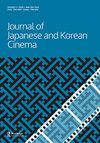成为主体的伦理//解读洪尚秀的《现在对,那时错》(2015)
引用次数: 1
摘要
洪尚秀(Hong Sang-soo)最近的电影《此时,彼时,错》(2015)讲述了一位电影导演在一个陌生的城市无所事事地度过了一天,遇到了一位他一见钟情的女艺术家的故事。洪为这段平淡无奇的邂逅构建了一个有趣的模板:影片的叙事平均分为两部分,只是将同一个故事重复了两次,没有任何因果关系。然而,同一故事的两个版本的并列,编织了一张由细微的、微不足道的差异组成的网,这对夫妇在每个版本中都是即兴创作的。影片的平行结构让观众可以通过幻想、欲望和行为之间的裂缝近距离观察主角。借鉴雅克·拉康关于人是一个分裂的主体的理论,以及他或她的伦理维度,在一个人通过行动坚定地表现欲望的时刻出现,本文将试图将洪的电影作为一种寻求人类欲望新基础的尝试。下面的讨论将讨论这部电影是如何实例化拉康对一个分裂而又渴望的主体的伦理基础的定义的,他在一个相当对抗的问题中阐明了这一点:“你的行为是否与你内心的欲望一致?”[1992, 314]。精神分析伦理学1959-1960:雅克·拉康研讨会第七卷。丹尼斯·波特翻译。纽约:诺顿出版社[m]。本文章由计算机程序翻译,如有差异,请以英文原文为准。
The ethics of becoming a subject // A reading of Hong Sang-soo’s Right Now, Wrong Then (2015)
ABSTRACT Hong Sang-soo’s recent film, Right Now, Wrong Then (2015), features a film director who idly spends a day in a strange city and meets a female artist whom he instantly falls for. Hong constructs an interesting template for this banal encounter: the film’s narrative is evenly divided into two parts, only to repeat the same story twice without any causal connection. The juxtaposition of two versions of the same story, however, weaves a web of minute, insignificant differences the couple improvises in each version. The film’s parallel structure allows viewers to closely observe the protagonists through fissures created between fantasy, desire and act. Drawing upon Jacques Lacan’s theorization of man as a divided subject and his or her ethical dimension that emerges at the moment of one’s unflinching manifestation of desire through an act, the article will attempt to engage with Hong’s film as an attempt to seek a new ground for human desire. The following discussion will address how the film instantiates Lacan’s definition of the ethical ground for a divided yet desiring subject, which he articulates in a rather confronting question: ‘Have you acted in conformity with the desire that is in you?’ [1992, 314. The Ethics of Psychoanalysis 1959–1960: The Seminar of Jacques Lacan Book VII. Translated by Dennis Porter. New York: W. W. Norton & Company].
求助全文
通过发布文献求助,成功后即可免费获取论文全文。
去求助
来源期刊

Journal of Japanese and Korean Cinema
Arts and Humanities-Visual Arts and Performing Arts
CiteScore
0.60
自引率
0.00%
发文量
16
期刊介绍:
Journal of Japanese and Korean Cinema is a fully refereed forum for the dissemination of scholarly work devoted to the cinemas of Japan and Korea and the interactions and relations between them. The increasingly transnational status of Japanese and Korean cinema underlines the need to deepen our understanding of this ever more globalized film-making region. Journal of Japanese and Korean Cinema is a peer-reviewed journal. The peer review process is double blind. Detailed Instructions for Authors can be found here.
 求助内容:
求助内容: 应助结果提醒方式:
应助结果提醒方式:


